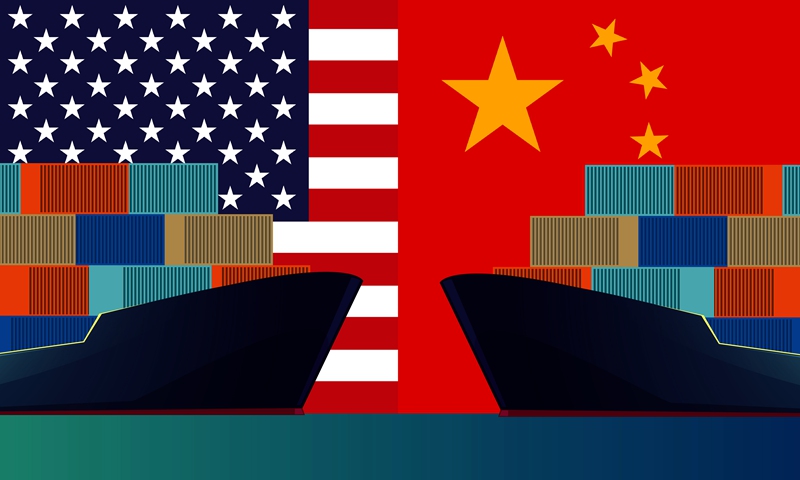
China US Photo:Global Times
Nearly three dozen of the US' most influential business groups, representing retailers, chip makers, farmers and others, asked the Biden administration to restart trade talks with China and cut tariffs on imports on Thursday, saying the tariffs are a drag on the US economy. They raised the appeal in a letter to US Trade Representative Katherine Tai and Treasury Secretary Janet Yellen. This is the clearest collective voice of the US business community on hoping to restore normal US-China trade since the Biden administration took office.
Over the past six months, the Biden administration has been delaying making statement on US trade policy with China under the excuse of making relevant reviews. But it has retained all his predecessor's China tariffs. There are even extra moves to crack down on Chinese companies. Piling pressure on Xinjiang-related trade issues have been quite prominent. In general, the US administration's current trade policy toward China is highly "Trumpized."
However, the trade war over the past three years failed to fix problems as how the Trump administration wished. Moreover, it has harmed American companies and consumers. Such awareness is becoming more and more common in the US. After a brief decline, China-US trade showed a tendency of a comprehensive recovery, and the US trade deficit further expanded. In the end, the US gets nothing in terms of bringing manufacturing back to the country. The Biden administration is now stuck in a predicament.
Normally, the US business community has a strong influence on government policies. When they collectively express their aversion toward tariffs, it is supposed to create immense pressure. However, when it comes to China-related issues, the US public opinion environment has been severely poisoned. Playing tough toward China has become "politically correct" in the US. Since the midterm elections are approaching, Biden's team is likely to believe that maintaining tariffs is a better way to win votes than removing them. It remains to be seen how much practical influence this appeal from the US business community can bring.
It is believed that US politics are now frozen. Any expectation for rationally righting the wrong does not make sense any more. Fortunately, the US is a diverse society with large policy gaps. It is difficult to block demands in the mark, which enabled China-US trade to rebound significantly against the odds of tariff pressure. Given such a reality in the US, China should continue developing substantial ties with US enterprises, keep participating in the construction of Americans' lives.
The Biden administration dares not reduce the tariffs imposed on Chinese products, but there is relatively large room to strive for tariff exemptions for certain Chinese goods. Yellen has expressed that tariffs on China are hurting American consumers. That being said, cutting down the harm can be realized through exempting more products from tariffs. Chinese and American companies should work together to boost efforts in this regard.
The Biden administration has increased the number of Chinese companies in the list of entities, but there have also been a few examples of Chinese companies being taken out of the list. It is necessary for Chinese companies to explore practical and effective measures in safeguarding their rights and interests and do not give up.
Facts have shown that China has the strength to play the game with the US in terms of trade policies, and it is right not to make concessions when playing tough is needed. Take TikTok. China insisted on not making substantial compromises, and it survived the crisis. We should learn the lesson from the case.
Under the current background, where there are still many uncertainties, it is particularly not appropriate for China to take a step back in trade policy. Instead, China should carry out tactical innovation in this game, letting the accumulated reality encircle or counter the US' unreasonable China-related policies.
US high-tariff policy is against the trend of the times and will not hold for long. Chinese companies have generally adapted to the new situation, while the US is suffering more from the tariffs than China. This has gradually become a consensus in US public opinion. And this has given China better conditions to maintain its strategic focus. In fact, it is also an increasingly clearer manifestation of China's comprehensive strength.




